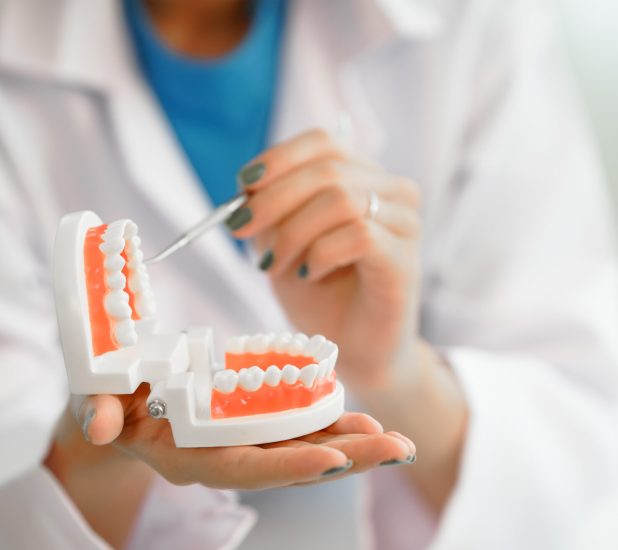The Cost of Dental Implants: What You Should Know
Are you considering improving your smile and pondering the decision to opt for dental implants? Are you curious about the costs associated with implant procedures? Discover essential information about dental implants and decide if they are the right solution for you.
Understanding Implantology
Implantology is a field of dentistry focused on rebuilding lost teeth due to accidents, damage, or poor oral hygiene. Its increasing popularity and rapid development have made implants more accessible to a wider audience.
What is a Dental Implant?
A dental implant serves as an artificial tooth root, typically made of titanium, replacing a missing or extracted natural root. It often takes the form of a screw implanted into the jawbone, onto which a custom-made porcelain or ceramic crown is mounted. Despite common concerns, the implantation procedure is usually painless, and having an implant feels no different from having natural teeth. Implants can be used for replacing a single tooth or reconstructing an entire dental arch.
Types of Dental Implants
Dentists use various types of dental implants, tailored to the unique characteristics of each patient. Titanium implants are most commonly used due to their durability and safety. However, their silver-gray appearance might be a drawback for some. Zirconia implants offer a more aesthetic alternative, resembling natural tooth tissue in texture and color. The market also offers several implant systems from different manufacturers, each slightly varying in effectiveness, quality, and price.
Explaining the Implantation Procedure
Implantation requires surgical intervention, which often causes concern among patients. Choosing an experienced specialist in implantology is key to a successful outcome. The process typically involves two stages: surgical placement of the implant and, after a period of osseointegration, the addition of a crown that mimics the appearance of natural teeth. The entire procedure can sometimes be completed in one visit, depending on the circumstances.
Dental Implant Cost
Implantation is one of the most expensive dental treatments, and prices vary depending on the location, dentist’s experience, type of implant, and the number of implants required. In Poland, the cost starts from about 1800 PLN for a single titanium screw, with the total expenditure for the complete procedure averaging over 4000 PLN.
Factors Influencing the Cost of a Dental Implant
1. Experience and qualifications of the specialist: An implantologist with extensive experience and industry recognition may charge higher fees for their services. The price of an implant from a specialist starts at 4000 PLN.
2. Type of implant: The market offers various brands and types of implants, each with different prices ranging from 2000 PLN to 5000 PLN. Implants made of more modern materials or featuring advanced technologies may be more expensive.
3. Complexity of the procedure: Simple cases requiring only standard implantation procedures may cost less than those requiring additional treatments such as bone augmentation, sinus lift, or periodontal treatment.
4. Number of implants: Implanting a larger number of teeth typically involves higher costs, although some clinics may offer discounts for a larger number of implants.
5. Material used for the crown: Crowns can be made from various materials such as porcelain, ceramic, or zirconia, and their price varies depending on the chosen material. The price of a crown on an implant can range from 3500 PLN to 5000 PLN.
6. Additional procedures: Some patients may require additional procedures before implantation, such as tooth extraction, root canal treatment on adjacent teeth, or preparatory work on the bone, which also affects the total cost.
Each case is individual, so the final price of a dental implant is best determined directly with the chosen specialist during a consultation visit, where the patient’s health condition will be assessed, and a treatment plan proposed.
Why is it worth having the implantation procedure done by a specialist surgeon?
Deciding to have a dental implant inserted by an experienced specialist is extremely important for several reasons:
1. High professional competence: A specialist in implantology possesses advanced knowledge and skills necessary to perform complex implantation procedures. Thanks to specialized training and experience, the specialist can effectively solve various clinical cases, including more complex ones.
2. Individual approach to the patient: A professional implantologist will devote time to a detailed consultation, assessment of oral health, and treatment planning tailored to the individual needs of the patient. This also includes determining the best type of implant and insertion technique.
3. Modern technologies and materials: The specialist usually has access to the latest technologies and materials, increasing the effectiveness of the treatment and patient comfort. Modern diagnostic tools, such as digital oral scanning or computed tomography, allow for precise planning and execution of the procedure.
4. Minimized risk of complications: The knowledge and experience of the specialist contribute to minimizing the risk of complications during the procedure and in the postoperative period. The specialist can correctly assess the risk and take appropriate preventive measures.
5. High quality and durability of treatment effects: Treatments performed by specialists are characterized by higher durability and aesthetics. Attention to detail and the use of the best available materials contribute to long-lasting and satisfying results.
6. Advanced treatment options: In the case of complex dental problems, such as significant bone loss, the specialist may offer advanced treatment options, such as bone augmentation or sinus lift, enabling the implantation of implants even in difficult cases.
7. Postoperative support and long-term care: Choosing a specialist also gives the patient access to professional postoperative care and long-term monitoring of implant status and oral health.
Investing in treatment by an experienced specialist increases the chances of seamless integration of the implant with the bone, thereby ensuring a durable and aesthetic restoration of lost teeth.
What are the contraindications to dental implants?
Contraindications to dental implant placement can be divided into absolute and relative, meaning that in some cases implantation may be impossible, and in others, it requires additional caution or preparation. Here are the most common ones:
Absolute contraindications:
– Incomplete bone growth: Implantation is usually not recommended for individuals who have not yet completed bone growth, meaning the procedure is typically contraindicated for children and adolescents.
– Severe immune system diseases: Individuals with uncontrolled autoimmune diseases or patients with immunodeficiencies may have an increased risk of complications.
– Untreated oral diseases: Active tooth decay, untreated periodontal disease, and other oral infections can increase the risk of implant failure.
– Certain severe systemic diseases: Diseases such as uncontrolled diabetes, advanced osteoporosis, or severe blood clotting disorders can negatively affect the healing process and integration of the implant with the bone.
– Radiation treatment in the head or neck area: Patients who have recently undergone radiotherapy in the head or neck region may have an increased risk of complications after implantation.
Relative contraindications:
– Smoking: Smoking significantly increases the risk of healing-related complications and may lower the success rate of implantation. Some specialists may require patients to quit smoking before the procedure and during the healing process.
– Moderate diabetes: Individuals with well-controlled diabetes may be candidates for implantation, but special caution and strict monitoring are required.
– Slight bone loss in the jaw: A lack of sufficient bone does not have to be an obstacle but may require additional procedures, such as bone augmentation, to create suitable conditions for the implant.
– Medications affecting bone healing: Patients taking medications that can affect bone metabolism, such as bisphosphonates used in the treatment of osteoporosis, may require additional assessment and caution.
– Psychological and behavioral: Conditions such as severe anxiety disorders, depression, and emotional instability can influence the decision on implantation.
It is always important to conduct a thorough consultation with a qualified specialist before deciding on implantation, who will assess the patient’s overall health and oral health and discuss all potential risks and benefits.
At the Warsaw Dental Center, our specialist surgeon will ensure that the implantation procedure is smooth and painless. Utilizing modern digital planning techniques and reputable implants, the insertion process is highly predictable and enjoys great success. The cost of a dental implant at the Warsaw Dental Center is 4000 PLN.
Article written on September 30, 2022 and updated on March 7, 2024 based on the latest technology and research.










